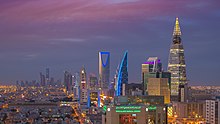Portal:Business
The Business and Economics Portal Business is the practice of making one's living or making money by producing or buying and selling products (such as goods and services). It is also "any activity or enterprise entered into for profit." A business entity is not necessarily separate from the owner and the creditors can hold the owner liable for debts the business has acquired. The taxation system for businesses is different from that of the corporates. A business structure does not allow for corporate tax rates. The proprietor is personally taxed on all income from the business. A distinction is made in law and public offices between the term business and a company such as a corporation or cooperative. Colloquially, the terms are used interchangeably. (Full article...) Economics (/ˌɛkəˈnɒmɪks, ˌiːkə-/) is a social science that studies the production, distribution, and consumption of goods and services. Economics focuses on the behaviour and interactions of economic agents and how economies work. Microeconomics analyses what's viewed as basic elements in the economy, including individual agents and markets, their interactions, and the outcomes of interactions. Individual agents may include, for example, households, firms, buyers, and sellers. Macroeconomics analyses the economy as a system where production, distribution, consumption, savings, and investment expenditure interact, and factors affecting it: factors of production, such as labour, capital, land, and enterprise, inflation, economic growth, and public policies that have impact on these elements. (Full article...) Selected articleThe Chicago school of economics is a school of thought favoring free-market economics practiced at and disseminated from the University of Chicago. The leaders were Nobel laureates George Stigler and Milton Friedman (pictured). It is associated with neoclassical price theory and free market libertarianism, refutation and rejection of Keynesianism in favor of monetarism (until the 1980s, when it turned to rational expectations), and rejection of regulation of business in favor of laissez-faire. In terms of methodology the stress is on "positive economics"--that is, empirically based studies using statistics, with less stress on theory and more on data. The school is noted for its very wide range of topics, from regulation to marriage, slavery and demography, that it studies. The term was coined in the 1950s to refer to economists teaching in the Economics Department at the University of Chicago, and closely related academic areas at the University such as the Graduate School of Business and the Law School. They met together in frequent intense discussions that helped set a group outlook on economic issues, based on price theory. The school of thought is not the same as the Department of Economics at the University of Chicago, widely considered one of the world’s foremost economics departments, having fielded more Nobel Prize winners and John Bates Clark medalists in economics than any other university. Only some, but not a majority, of the professors in the economics department are considered part of the school of thought. Selected image
Selected economyThe economy of Saudi Arabia is the second-largest in the Middle East and the nineteenth-largest in the world. The Saudi economy is highly reliant on its petroleum sector. Oil accounts on average in recent years for approximately 40% of Saudi GDP and 75% of fiscal revenue, with substantial fluctuations depending on oil prices each year. The kingdom has the second-largest proven petroleum reserves, and the fourth-largest measured natural gas reserves. Saudi Arabia is currently the largest exporter of petroleum in the world. Other major parts of the economy include refining and chemical manufacturing from the oil reserves, much of which is vertically integrated in the state-owned enterprise, Saudi Aramco. Saudi Arabia is permanent and founding member of OPEC In 2016, the Saudi government launched its Saudi Vision 2030 program to reduce its dependency on oil and diversify its economic resources. By 2022, Saudi Arabia had only modestly reduced its dependence on oil. (Full article...) Selected quote"Gresham's law has made a modified reappearance. For most cars traded will be the "lemon", and good cars may not be traded at all. The"bad" cars tend to drive out the good (in much the same way that bad money drives out the good). But the analogy with Gresham's law is not quite complete: bad cars drive out the good because they sell at the same price as good can; similarly, bad money drives out good because the exchange rate is even. But the bad cars sell at the same price as good cars since it is impossible for a buyer to tell the difference between a good and a bad car; only the seller knows. In Gresham's law, however, presumably both buyer and seller can tell the difference between good and bad money. So the analogy is instructive, but not complete."
TopicsRelated WikiProjectsDid you know (auto-generated) -
On this day in business history
General imagesThe following are images from various business-related articles on Wikipedia.
More did you know
Business news Wikinews Economy and business portal
|
- Portals with triaged subpages from June 2018
- All portals with triaged subpages
- All portals
- Portals with no named maintainer
- Business and economics portal
- Random portal component with over 50 available subpages
- Random portal component with 26–30 available image subpages
- Random portal component with more available subpages than specified max
- Random portal component with 11–15 available subpages
- Society portals
- Business
- Redirect targets of redirected portals with existing subpages






































